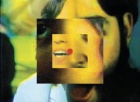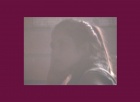A wall is just a wall (and nothing more at all) is an exhibition by Kapwani Kiwanga, named for an excerpt from the poem “Affirmation” by civil rights revolutionary Assata Shakur. Showing at Esker Foundation, the exhibition is a call for resistance against institutionally and architecturally engrained modes of inequity and segregation, a study of the vibrational power of colour, and its institutional weaponization. Prints in Kiwanga’s exhibition, draped over common construction materials, and based off of aerial images of unsanctioned pathways in Calgary—paths made by pedestrians forsaking the pavement for a more efficient route—evidence and highlight the importance of local micro-deviancy from institutional behaviour.
Luma Quarterly commissioned a suite of poems by Neil Surkan in response to Kiwanga’s film in the exhibition, A Primer, a silent and sweeping camera pan through constructed warm white, Baker-Miller Pink, spinach green walls, and panopticon glass, with appearances of Monstera deliciosa and a metal pedestal fan. Returning to poetry as descriptor, and with Kiwanga’s photobiological study in mind, Surkan meditates on colour, nature, freedom, chaos, and the aesthetics of isolation in the specific site of Calgary.
|
How can I make time out of toxins? —Lisa Robertson
A Float
If I’m an archipelago of permeable particles then a seamount, deeply squatted, on its submarine volcano, tangled with soft kelp and corals, must be what began to show not long after the lid closed on that deprivation tank in between Hillhurst boutiques— not the soul, a shank of instinct on repeat below whatever part of me imagined freedom coming from floating apart.
Underneath that lulling plane’s peaceful harmony, the start of warm erosion, panged a hardened love of form.
A Wind The form being a projector of brassy trombone slide, drone prop tearing by laser, salmon gored on rocks, beer stein with power tools, sprinter on orange rubber track, who, drinking light through their eyes, flush
A Drive Stippled creatures that we are, Idling then surging south, shining upward, floor by floor. Here and there the silhouettes A cube van braked to make a point, pink, all at once and thick. the airwaves seeping in—a mattress
A Room While housesitting
|
Neil Surkan's debut poetry collection, On High, is forthcoming from McGill-Queen's University Press (Fall, 2018). His chapbook, Super, Natural, was published by Anstruther Press (March, 2017). His most recent poems have appeared or are forthcoming in The Fiddlehead, EVENT, and CAROUSEL, among others. He lives in Calgary.


